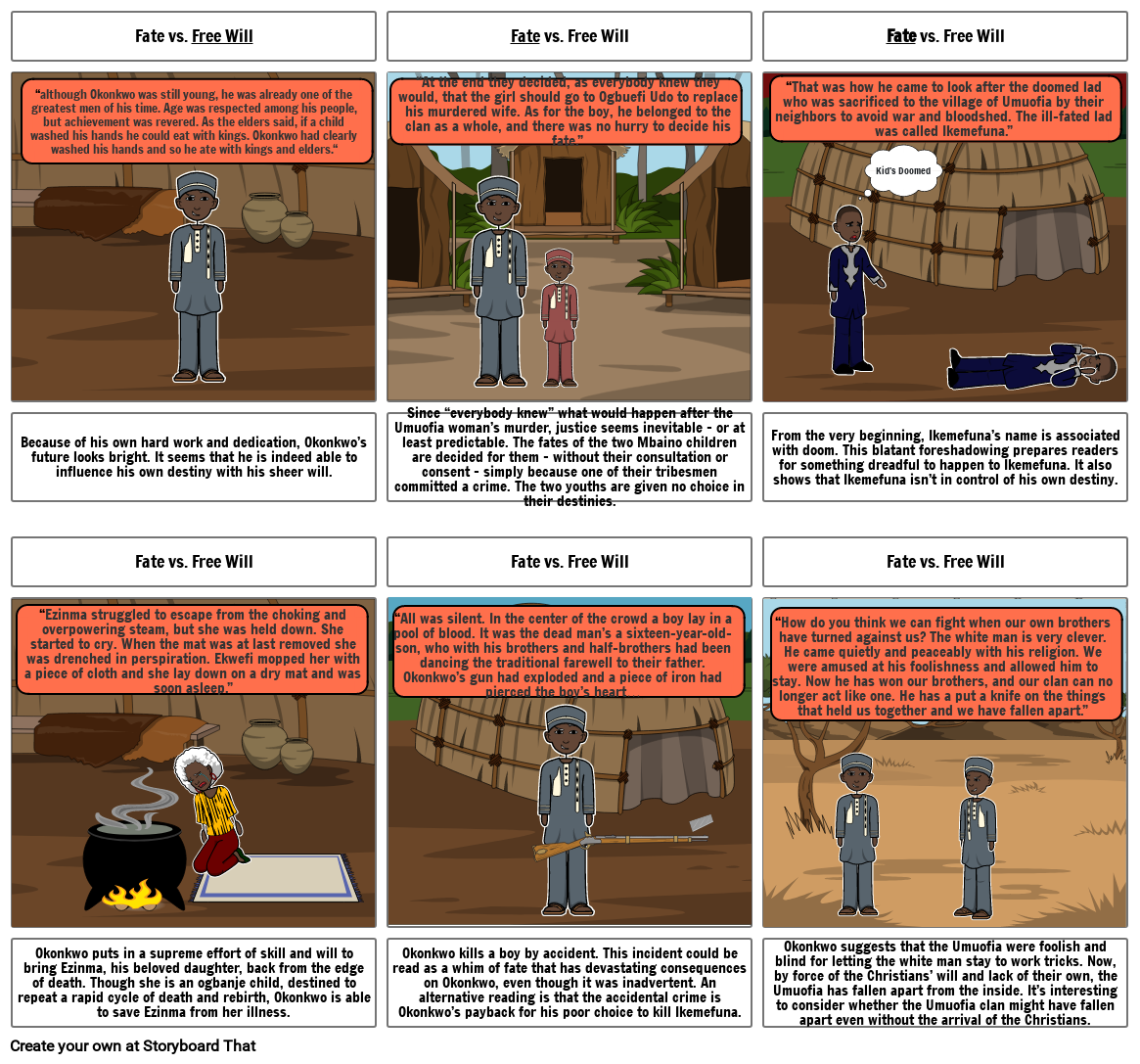Unknown Story

Storyboard Text
- Fate vs. Free Will
- “although Okonkwo was still young, he was already one of the greatest men of his time. Age was respected among his people, but achievement was revered. As the elders said, if a child washed his hands he could eat with kings. Okonkwo had clearly washed his hands and so he ate with kings and elders.“
- Fate vs. Free Will
- “At the end they decided, as everybody knew they would, that the girl should go to Ogbuefi Udo to replace his murdered wife. As for the boy, he belonged to the clan as a whole, and there was no hurry to decide his fate.”
- Fate vs. Free Will
- “That was how he came to look after the doomed lad who was sacrificed to the village of Umuofia by their neighbors to avoid war and bloodshed. The ill-fated lad was called Ikemefuna.”
- Kid's Doomed
- Because of his own hard work and dedication, Okonkwo’s future looks bright. It seems that he is indeed able to influence his own destiny with his sheer will.
- Fate vs. Free Will
- “Ezinma struggled to escape from the choking and overpowering steam, but she was held down. She started to cry. When the mat was at last removed she was drenched in perspiration. Ekwefi mopped her with a piece of cloth and she lay down on a dry mat and was soon asleep.”
- Since “everybody knew” what would happen after the Umuofia woman’s murder, justice seems inevitable – or at least predictable. The fates of the two Mbaino children are decided for them – without their consultation or consent – simply because one of their tribesmen committed a crime. The two youths are given no choice in their destinies.
- Fate vs. Free Will
- “All was silent. In the center of the crowd a boy lay in a pool of blood. It was the dead man’s a sixteen-year-old-son, who with his brothers and half-brothers had been dancing the traditional farewell to their father. Okonkwo’s gun had exploded and a piece of iron had pierced the boy’s heart…
- From the very beginning, Ikemefuna’s name is associated with doom. This blatant foreshadowing prepares readers for something dreadful to happen to Ikemefuna. It also shows that Ikemefuna isn’t in control of his own destiny.
- Fate vs. Free Will
- “How do you think we can fight when our own brothers have turned against us? The white man is very clever. He came quietly and peaceably with his religion. We were amused at his foolishness and allowed him to stay. Now he has won our brothers, and our clan can no longer act like one. He has a put a knife on the things that held us together and we have fallen apart.”
- Okonkwo puts in a supreme effort of skill and will to bring Ezinma, his beloved daughter, back from the edge of death. Though she is an ogbanje child, destined to repeat a rapid cycle of death and rebirth, Okonkwo is able to save Ezinma from her illness.
- Okonkwo kills a boy by accident. This incident could be read as a whim of fate that has devastating consequences on Okonkwo, even though it was inadvertent. An alternative reading is that the accidental crime is Okonkwo’s payback for his poor choice to kill Ikemefuna.
- Okonkwo suggests that the Umuofia were foolish and blind for letting the white man stay to work tricks. Now, by force of the Christians’ will and lack of their own, the Umuofia has fallen apart from the inside. It’s interesting to consider whether the Umuofia clan might have fallen apart even without the arrival of the Christians.
Over 30 Million Storyboards Created

